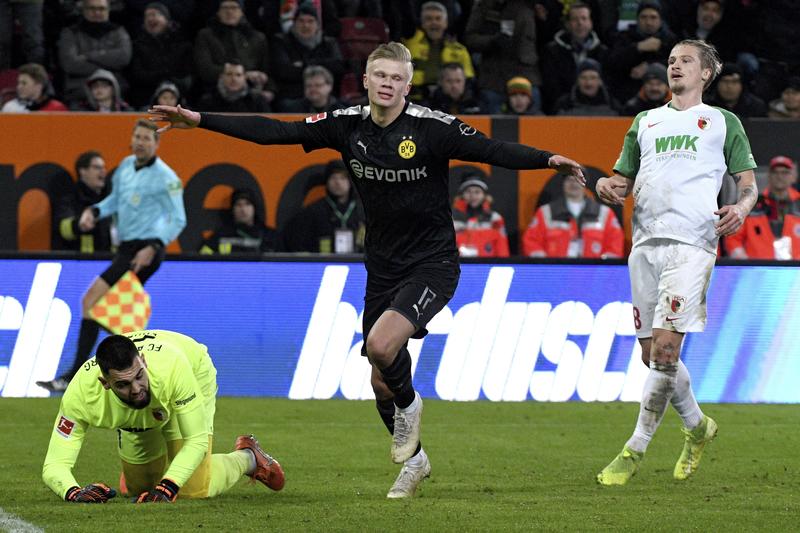 Dortmund's Erling Haaland celebrates after scoring a goal in a German Bundesliga soccer match between FC Augsburg and Borussia Dortmund in Augsburg, Germany, Jan18, 2020. ( STEFAN PUCHNER / DPA VIA AP)
Dortmund's Erling Haaland celebrates after scoring a goal in a German Bundesliga soccer match between FC Augsburg and Borussia Dortmund in Augsburg, Germany, Jan18, 2020. ( STEFAN PUCHNER / DPA VIA AP)
BERLIN - The German Bundesliga is celebrating the revival of a long-forgotten force of football.
Erling Haaland not only scored three goals in his first games for Borussia Dortmund but set the starting point for a system change when turning up on the pitch
While center-forwards seemed out of fashion, the arrival of Erling Haaland at Borussia Dortmund triggered off a new era.
The Norwegian striker not only scored three goals in his first games but set the starting point for a system change when turning up on the pitch. The 19-year-old showed the new tactical system with his fingers: 4-3-2-1.
Dortmund admitted having made a mistake not to sign a robust "Mittelstuermer" (center forward) in advance of the 2019/2020 season and invested 20 million euros for the youngster to complete its range of options in the winter break.
The sports magazine Kicker called the national league's 18th round of matches "campaign day" as several true center forwards were successful. So far, Robert Lewandowski might have stood for a rare species, the Bayern Munich forward for a reason got company.
ALSO READ: German football's desperate fight against bad behaviour
"Top international sides always acted with a man in the box," 2013 treble winner Jupp Heynckes said. Modern football needs a central reference point, able to keep the ball and pass it on.
Former German international and Cologne striker Dieter Mueller is convinced modern football "more than ever requires a spearhead."
Germany's most successful national team scorer (71 goals), Miroslav Klose, said: "The man in the box never dies." The 137 capped former Bayern striker is the World Cup record scorer with 16 goals.
"Dortmund needed a finisher for its game between the lines," Bayern's under-17 coach said, predicting an upswing for the Blacks and Yellows.
Haaland helps to combine the playful style with efficiency. "To be successful on the international stage, you need both types," 1980 European Champion Horst Hrubesch said. "There was a reason for Leipzig to sign Patrick Schick as he creates space for fast Timo Werner invading the opponents' box," the "Kopfball-Ungeheuer" (heading monster), former Hamburg professional and German national team youth coach commented.
The 68-year-old called it a significant disadvantage that "we don't have such a player for the German national team."
Due to his growing tasks, the modern center forward requires a new rating as he is no longer only dedicated to scoring goals. "He has to make space and wait for his team to catch up in the front line aside of using heading opportunities," Hrubesch emphasized, adding that Bayern's Lewandowski is the only one combining both types despite him getting support from Thomas Mueller and the wings.
READ MORE: Bundesliga: Thrilling title-race, Europe's goal machine
With Leipzig, Bayern, Dortmund, and Moenchengladbach, the first four teams of the Bundesliga table count on that shared role model upfront. 14 units of the German league are counting on a real spearhead this season.
Hertha BSC's new coach Juergen Klinsmann is desperately trying to sign a box-striker before the transfer window is closing on January 31. The former German national coach said to survive this season, a center striker is inevitable.


